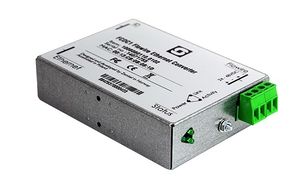Exigo Flowire Guidelines
This article aims to describe the recommended use of the Flowire Converter with the Exigo PA/GA system.
How to use Flowire
General
The Flowire Converters, FCDC1 and FCDC2, enable Ethernet to run on the same two wires as power, providing simpler cabling and opening up for longer cable hauls.
The FCDC1 is capable of powering Ethernet devices attached to it, such as IP PA panels with PoE Mode B. FCDC2 does not forward power to its Ethernet port.
It is recommended to use only two Flowires on each link. It is possible to connect more, using cluster/bus configurations, but this should be avoided if possible, and is not an option for redundant solutions such as a PA panel connected to an AB system via Flowire links.
Flowire links must be physically separated in the rack, and must have separate Network Management Keys (NMK) to avoid detrimental results from cross talk. Conversely, Flowires meant to communicate with each other must use the same NMK.
Power
Flowire Converters operate on 24VDC or 48VDC.
- 48VDC is required to power IP POE products, such as PA panels via the Ethernet port.
- 24VDC is required to power Vingtor-Stentofon Ex panels: EAPFX-1 and EAPFX-6. These panels do not tolerate 48VDC.
Only FCDC1 forwards power via the Ethernet port. If this is not required, use FCDC2. Always use FCDC2 for connecting to the switch, as FCDC1 would forward power to the switch port.
2.3 Rapid Spanning Tree Protocol (RSTP)
Flowire can be used to connect redundant access panels. STP or RSTP is used in the switches and panels to prevent loops and other issues in the network. RSTP should be enabled to get the fastest response times if changes occur on the network.
